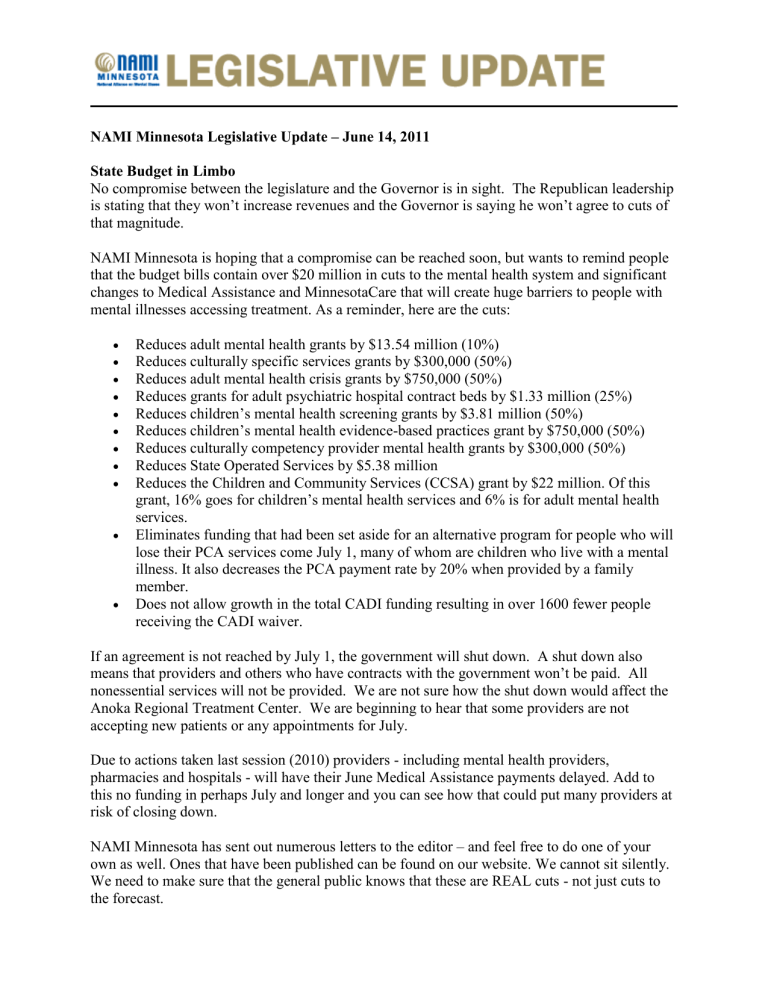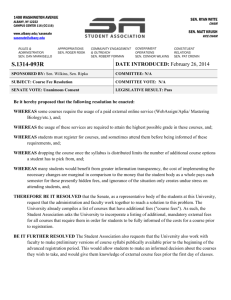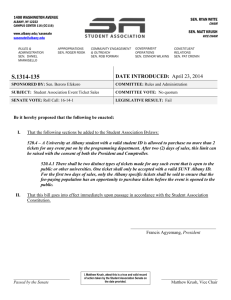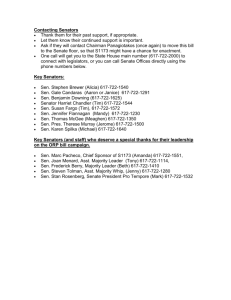here. - NAMI Minnesota

NAMI Minnesota Legislative Update – June 14, 2011
State Budget in Limbo
No compromise between the legislature and the Governor is in sight. The Republican leadership is stating that they won’t increase revenues and the Governor is saying he won’t agree to cuts of that magnitude.
NAMI Minnesota is hoping that a compromise can be reached soon, but wants to remind people that the budget bills contain over $20 million in cuts to the mental health system and significant changes to Medical Assistance and MinnesotaCare that will create huge barriers to people with mental illnesses accessing treatment. As a reminder, here are the cuts:
Reduces adult mental health grants by $13.54 million (10%)
Reduces culturally specific services grants by $300,000 (50%)
Reduces adult mental health crisis grants by $750,000 (50%)
Reduces grants for adult psychiatric hospital contract beds by $1.33 million (25%)
Reduces children’s mental health screening grants by $3.81 million (50%)
Reduces children’s mental health evidence-based practices grant by $750,000 (50%)
Reduces culturally competency provider mental health grants by $300,000 (50%)
Reduces State Operated Services by $5.38 million
Reduces the Children and Community Services (CCSA) grant by $22 million. Of this grant, 16% goes for children’s mental health services and 6% is for adult mental health services.
Eliminates funding that had been set aside for an alternative program for people who will
lose their PCA services come July 1, many of whom are children who live with a mental illness. It also decreases the PCA payment rate by 20% when provided by a family member.
Does not allow growth in the total CADI funding resulting in over 1600 fewer people receiving the CADI waiver.
If an agreement is not reached by July 1, the government will shut down. A shut down also means that providers and others who have contracts with the government won’t be paid. All nonessential services will not be provided. We are not sure how the shut down would affect the
Anoka Regional Treatment Center. We are beginning to hear that some providers are not accepting new patients or any appointments for July.
Due to actions taken last session (2010) providers - including mental health providers, pharmacies and hospitals - will have their June Medical Assistance payments delayed. Add to this no funding in perhaps July and longer and you can see how that could put many providers at risk of closing down.
NAMI Minnesota has sent out numerous letters to the editor – and feel free to do one of your own as well. Ones that have been published can be found on our website. We cannot sit silently.
We need to make sure that the general public knows that these are REAL cuts - not just cuts to the forecast.
Action Alert
NAMI members are urged to take two actions.
One, if your state representative and/or senator is holding a town hall meeting, please attend!
Raise your hand and ask about the impact of the proposed budget on mental health funding. Don’t know when the town hall meetings are? Simply go to their website and sign-up for their newsletter. Click here to do that.
Two, send an e-mail or make a phone call to House and Senate Republican leadership – again.
Your message is “
I am a NAMI member and I (live with a mental illness, have a family member, work in the field) and I urge you to seek a compromise with the Governor. Our mental health system simply cannot withstand further cuts – and these are real cuts to mental health care grants, not just reductions in the forecast. People with mental illnesses need the early opt-in
Medical Assistance and the proposed changes to the MinnesotaCare program will not work.
Relying on the old Coordinated Care Delivery Systems and health care policies with high deductibles will simply result in making mental health care inaccessible and unaffordable. Do not balance the budget on the backs of people with mental illnesses.
"
Here is what one member sent:
“Minnesota does better than most states, but as a parent to three children and two of them having a major mental illness, I beg you to stop taking away from the programs and community supports for those living with mental illness. My son is now an adult trying to get care and to keep his medical coverage. Without the programs in place, he would not be able to hold a job, and to continue supporting himself…I urge any lawmaker in Minnesota to contact me or another person living with mental illness in their families. Even with the most vigilant of care and compassion, if there is no system of care, we cannot help those we love.”
If this mom can take the time to write, so can you. Here is who to contact:
Rep. Kurt Zellers
651-296-5502 rep.kurt.zellers@house.mn
Rep. Matt Dean
651-296-3018 rep.matt.dean@house.mn
Rep. Rod Hamilton
651-296-5373 rep.rod.hamilton@house.mn
Sen. Amy Koch
651-296-5981 sen.amy.koch@senate.mn
Sen. Geoff Michel
651-296-6238 sen.geoff.michel@senate.mn
Sen. Chris Gerlach
651-296-4120 sen.chris.gerlach@senate.mn
Sen. Michelle Fischbach
651-296-2084 sen.michelle.fischbach@senate.mn
Legislation that Passed
While we don’t have any relevant budget bills, there were some policy bills that passed. Listed below are summaries of new laws impacting the mental health system.
Adult Mental Health
Foster Care Moratorium
The current prohibition on any new corporate foster care licenses is waived if they are being used in connection with a restructuring of state operated facilities. Chapter 86
Program Rates
Rate setting for Intensive Residential Treatment Services (IRTS), Assertive Community
Treatment (ACT) and Crisis Residential beds will be set by the state instead of by counties. IRTS and ACT teams serve people from more than one county so this should simplify things for them by not having to negotiate rates with each county. In setting the rates, the department will look at the actual costs of the program (for staff, etc.). There will also be up to 5% of the rate set aside for meeting performance criteria Chapter 86
Sex Offenders
Under the current commitment law, people who are committed as sexually dangerous persons or having sexual psychopathic personalities are grouped with people who are “mentally ill and dangerous.” This new law directs the department to return next session with changes to the commitment law to separate the two out. In addition it requires the head of the facility to contact police if someone is absent without permission or doesn’t return from a pass. Chapter 102
Treatment
Adult day treatment must be provided at least two days a week now, instead of one day a week.
A diagnostic assessment, which is to be completed within 5 days of entering a hospital or residential program, or within 5 days after the second appointment or within 30 days of intake for Adult Rehabilitation Mental Health Services (ARMHS), now does not have to completed if there has been one completed within three years of admission. In those cases, the facility only needs to update the assessment. An update includes a written summary of the person’s current mental health status and a face-to-face interview with the person. Chapter 86
Children’s Mental Health
Mental Health Screening
Children in the child protection or juvenile justice system are to receive a mental health screening. The law was changed regarding parental permission. For children in the child protection system, parents will continue to be notified and will have the option of telling the court that they don’t want their child screened. The change is in the juvenile justice system.
Parents must consent to a screening for children who are found to be delinquent or committed a juvenile petty offense for the third or subsequent time. The court can, however, decide it is in the child’s best interest to have the screening and thus can order it. Chapter 86
Out-of-Home Placement
When a parent is requesting residential treatment for their child, they must go through a county
“juvenile screening team” process. There had been problems with parents receiving a response from the county and being told that they could not attend the meetings where these decisions take place. Thus, this process was changed to clarify that the county screening team decision must be
decided within 15 days of a request. In addition, the screening team includes a child’s parents, guardians or permanent legal custodian. A small reference error in the voluntary placement law
(260D) was also corrected. Chapter 86.
Prairie Care
They will be allowed to add an additional 30 beds to their brand new free-standing psychiatric hospital for children. Chapter 51
Youth ACT Teams
There are now standards for youth assertive community treatment (ACT) teams. ACT teams will be made available to youth ages 16 to 21 that have a serious mental illness or co-occurring serious mental illness and substance abuse addiction who require intensive services to prevent hospitalizations or residential treatment. This service is really for those youth who have a history of not succeeding in the community, school and home and who likely need adult mental health services within two years. Services will include: individual, family or group therapy; individual, family or group skills training; crisis assistance; medication management; mental health care management; medication education services; care coordination; psychoeducation with friends and family; clinical consultation to youth’s employer, school or courts or other agencies; crisis and stabilization; transition; integrated dual disorders treatment; and housing access support.
The ACT team will include a mental health professional, advance-practice nurse or child psychiatrist, alcohol and drug counselor trained in mental health, and a peer specialist. It can also include a vocational specialist, educational specialist, mental health practitioner, consulting psychiatrist, mental health manager, housing specialty and others specific to the individual such as a probation officer or member of their IEP team. There are other prescribed standards. There is a requirement that the team actively engage the youth’s family and significant others including sharing of information. Chapter 86
Criminal Justice
Detention of Juveniles
An adolescent certified to be tried as an adult can now be held in a secure juvenile detention facility while the outcomes of criminal proceedings are pending. Previously, it was unclear if this was allowed so young people who have been certified are often held in adult detention facilities.
The change will not guarantee young people who are certified won’t be held in adult facilities but it clarifies that judges have the option to hold them in a juvenile facility if one is available.
Chapter 72
Juvenile Justice Information Sharing
Law enforcement and prosecutors can now use “e-charging” services in juvenile justice proceedings. E-charging is a tool that makes it easier to share information about a case or defendant. Chapter 91
Health Care
Children’s Health Care Services
The commissioner of human services will provide information on how Minnesota public health care programs (Medical Assistance, MinnesotaCare) spend money on treatment and services for children and young adults, aged birth to 22 (separate from their parents). Chapter 29
Chemical Dependency
Changes were made to the rate setting for chemical dependency residential treatment programs, including adding program standards for each rate and rate enhancements tied to the standards.
There are additional standards related to treating people with co-occurring disorders. They
include a) having 25% of the counseling staff be mental health professionals or are students or licensing candidates; b) clients scoring positive on a mental health screen receive a diagnostic assessment within ten days of admission; c) there are standards for multidisciplinary review; d) family education is offered that covers both CD and mental illnesses and the interaction; e) cooccurring counseling staff receive eight hours of co-occurring disorder training annually.
Children’s facilities licensed and certified under Chapter 2960 are exempt from some of the new standards. Chapter 86
Paramedics
An Emergency Medical Technician-Paramedic who has two full years of services can, with additional training and certification, become an EMT-community paramedic. Community paramedics may provide services as directed by a patient care plan to prevent the use of ambulances or emergency room visits. This could include minor medical procedures, assessments (within their scope of practice), care-coordination, patient education.
The commissioner of human services will determine precisely which community paramedic services will be covered under Minnesota health care programs by January 15, 2012. The commissioner will also study how covering community paramedic services under MinnesotaCare and Medical assistance impacts the cost and quality of care under those programs and the coordination of these services with the health care home services. A report will be issued to the legislature in 2014. Chapter 12
Detox Services
In addition to mental health and chemical dependency treatment, state and county governments can enter into contracts with detox services in bordering states (N.Dakota, S. Dakota, WI or
Iowa) so people in Minnesota can receive services closer to home. Chapter 110
Legal
Commitment Act
The definition of a health officer under the commitment act was changed to include a mental health professional providing mobile crisis intervention services. A minor change was made to say it also includes “a formally designated member of a pre-petition screening team” instead of
“formally designated members of a pre-petition screening team.” Chapter 86
Mental Health Care
Crisis Services
The law was changed so that mental health crisis teams are available to meet people face-to-face in a hospital emergency room. In addition to having regularly scheduled interagency meetings with county emergency services and crisis teams are to coordinate with hospitals, ambulance, transportation services, social services, and law enforcement. Crisis assessments are also now supposed to take into account the recipient’s preferences as communicated directly by them or through a health care directive, treatment plan, crisis plan or a wellness recovery action plan.
Chapter 86
Other
Vulnerable Adults
People who criminally abuse a vulnerable adult must now register as predatory offenders. The vulnerable adult maltreatment review panel now includes a representative from the county human services administrators appointed by the commissioner of human services or the administrator's designee. Also, the review panel must communicate in writing its findings and decisions to the vulnerable adult or the interested person acting on behalf of the vulnerable adult who requested the review. A vulnerable adult and any known guardian or health care agent will
now be notified in writing by the human services referee about any hearings and the right to file a signed written statement. A vulnerable adult may be called as a witness with special consideration given to the best interest and well being of the vulnerable adult. An assault or inflicting bodily harm to a vulnerable adult will now be a gross misdemeanor. Chapter 28
Another State Legislative Issue
The Senate Committee on Rules and Administration, the Subcommittee on Ethical Conduct, found today that Sen. Hoffman was basically incorrect in her characterization of Sen Goodwin’s remarks on the senate floor. This issue has been in the paper. Sen. Goodwin was referencing the old names of the institutions when Sen. Hoffman tweeted that Sen Goodwin was calling people with mental illnesses “idiots and imbeciles.” NAMI, along with numerous other mental health organizations, sent a letter to Sen. Goodwin letting her know that we were not offended by her remarks and understood that she was referencing historical names. In addition, she was referencing how far we had come and that the cuts that were being proposed would undo so much of the good work we have made in the past ten years. The committee recommended that
Sen Hoffman issue an apology to Sen. Goodwin, remove that tweet, and let people know through twitter where to read the resolution of this issue and then the complaint is dismissed.
Federal Issues
As Congress continues to debate both the debt ceiling increase and the Fiscal Year 2012 budget, several proposed methods of reducing federal spending could have an extremely negative impact on the future of the Medicaid program and other key federal programs that children and adults living with mental illnesses depend on. NAMI remains extremely concerned about the long-term and short-term implications of these proposals, particularly a “global cap” on federal spending. A global cap would very likely result in steep cuts to Medicaid, housing and homelessness programs, veterans’ services, research on mental illness and many other important programs.
The State Flexibility Act (H.R. 1683/S. 868), sponsored by Rep. Phil Gingrey (R-GA) and Sen.
Orrin Hatch (R-UT) would repeal the maintenance of effort provisions (MOE) achieved under the health reform law, the Affordable Care Act (ACA). The House Energy and Commerce
Subcommittee on Health recently reported the State Flexibility Act favorably to the full
Committee.
The MOE requires states to keep their current eligibility rules for health coverage. The State
Flexibility Act would allow states to roll back eligibility, potentially cutting off 400,000 people, about two-thirds of whom are children, according to a Congressional Budget Office (CBO) report . Additionally, the CBO estimates "approximately 300,000 of those individuals would become uninsured," meaning they would not find alternative means of health coverage after being kicked off.
Action Alert
Please contact your U.S. Representative and Senators to urge them to oppose any global caps on entitlement spending that do not specifically exempt safety net programs for the most vulnerable individuals, including people living with serious mental illnesses. It is critical that members of
Congress hear from constituents like you that typically can have the most sway over legislators’ votes.
Oppose the State Flexibility Act (H.R. 1683/S.868)!
Protect Medicaid as an entitlement program!
Reject spending caps and triggers that would jeopardize health coverage for low-income
children and adults with mental illnesses!
Champion a balanced approach of revenue increases and spending cuts to reduce the deficit!
On Tuesday, June 14, Wednesday, June 15, and Thursday, June 16, a toll-free number will be available to NAMI advocates to call their members of Congress in opposition to efforts to convert Medicaid to a block grant. Advocates are strongly encouraged to call 1 (866) 922-4970 to weigh with their House member and Senators.
Senator Alan Stuart "Al" Franken
320 Hart Senate Office Building
Washington, DC 20510
(202) 224-5641
Contact: http://franken.senate.gov/?p=email_al
Senator Amy Klobuchar
United States Senate
302 Hart Senate Office Building
Washington, DC 20510
(202) 224-3244 http://klobuchar.senate.gov/emailamy.cfm
First District
Timothy J. Walz
1529 Longworth House Office Building
Washington, DC 20515
(202) 225-2472
Contact: http://walz.house.gov/
Second District
John Kline
2439 Rayburn House Office Building
Washington, DC 20515
(202) 225-2271 http://kline.house.gov/index.cfm?sectionid=4§iontree=4
Third District
Erik Paulsen
126 Cannon House Office Building
Washington, DC 20515-2303
(202) 225-2871
Fax: (202) 225-6351 https://forms.house.gov/paulsen/contact-form.shtml
Fourth District
Betty McCollum
1029 Longworth House Office Building
Washington, DC 20515
(202) 225-6631 http://forms.house.gov/mccollum/webforms/issue_subscribe.htm
Fifth District
Keith Ellison
1027 Longworth House Office Building
Washington, DC 20515
(202) 225-4755
(202) 225-4886 fax
Contact form: http://ellison.house.gov/index.php?option=com_content&task=view&id=36&Itemid=45
Sixth District
Michele Bachmann
412 Cannon House Office Building
Washington, DC 20515
(202) 225-2331
Contact form: http://bachmann.house.gov/Email_zip.htm
Seventh District
Collin C. Peterson
2159 Rayburn House Office Building
Washington, DC 20515
(202) 225-2165
Contact form: http://collinpeterson.house.gov/email.htm
Eighth District
Chip Cravaack
508 Cannon House Office Building
Washington, DC 20515
(202) 225-6211
Contact form: https://cravaack.house.gov/contact-me/email-me
Also, Sen. Franken - along with 37 other U.S. Senators - signed a letter to President Obama urging him to not accept block grants and other arbitrary limits to Medicaid. We thank him for this.








